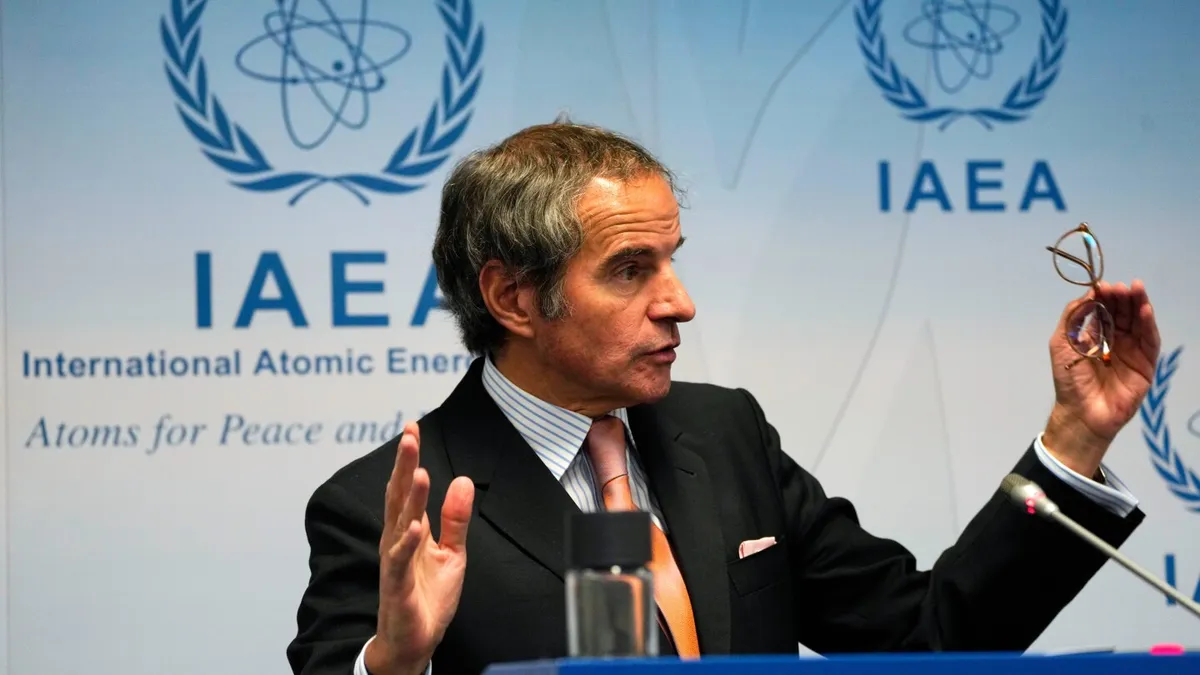
According to a confidential report from the U.N. nuclear watchdog, Iran has significantly increased its stockpile of uranium enriched to near weapons-grade levels. This alarming update was published on Saturday and comes at a critical juncture as the administration of U.S. President Donald Trump seeks to negotiate a deal with Tehran aimed at limiting its nuclear program. Despite multiple rounds of talks, no agreement has been reached thus far.
The report, released by the International Atomic Energy Agency (IAEA) based in Vienna, indicates that as of May 17, Iran has accumulated a total of 408.6 kilograms (900.8 pounds) of uranium enriched to 60%. This marks an increase of 133.8 kilograms (294.9 pounds)—nearly 50%—since the IAEA's last report in February, which recorded a stockpile of 274.8 kilograms (605.8 pounds) of 60% enriched uranium. This level of enrichment is just a technical step away from achieving weapons-grade levels of 90%.
The IAEA report has raised serious concerns, stating that Iran is now "the only non-nuclear-weapon state to produce such material." It warned that approximately 42 kilograms of this enriched uranium could potentially be enough to create one atomic bomb if further enriched to 90%. The report also estimated that Iran's total stockpile of enriched uranium, including lower levels, stands at 9,247.6 kilograms (20,387.4 pounds), an increase of 953.2 kilograms (2,101.4 pounds) since February.
Iran has consistently asserted that its nuclear program is intended for peaceful purposes. However, IAEA chief Rafael Mariano Grossi has cautioned that Tehran possesses sufficient uranium, enriched to near-weapons-grade levels, to manufacture "several" nuclear bombs should it decide to pursue that path. While U.S. intelligence agencies maintain that Iran has not yet embarked on a weapons program, they acknowledge that the country has engaged in activities that could position it to develop a nuclear device if it chooses to do so.
In response to the IAEA report, Israeli Prime Minister Benjamin Netanyahu stated that it serves as a clear warning sign that "Iran is totally determined to complete its nuclear weapons program." He emphasized that the IAEA's findings corroborate Israel's long-held belief that Iran's nuclear ambitions are not for peaceful purposes. Netanyahu further claimed that Iran's level of enrichment "has no civilian justification whatsoever" and urged the international community to "act now to stop Iran."
Grossi reiterated his urgent appeal for Iran to fully cooperate with the IAEA’s ongoing investigation into uranium traces found at various undisclosed sites within the country. The IAEA also distributed a second, detailed report highlighting Iran's inadequate cooperation regarding uranium traces discovered at sites that Tehran has not acknowledged as nuclear locations. Western officials suspect that these traces may indicate a clandestine military nuclear program that was operational until 2003.
After initially restricting access to IAEA inspectors, Iran eventually allowed the collection of samples in 2020 from two locations where manmade uranium particles were detected. The sites—Turquzabad, Varamin, and Marivan—are under scrutiny as part of the IAEA's investigation. A fourth site, Lavisan-Shian, is also included in the probe, but the IAEA was unable to inspect it as it was demolished by Iran post-2003. The IAEA's comprehensive report suggests that the lack of responses from Iran regarding these locations has led to conclusions that they were part of a previously undeclared nuclear program.
The comprehensive report released on Saturday could pave the way for further actions from European nations, potentially escalating tensions between Iran and the West. European countries may consider reinstating snap-back sanctions against Iran that were suspended under the original 2015 nuclear deal, especially as the agreement's expiration approaches in October.
On the domestic front, senior Iranian officials have downplayed speculation about an imminent nuclear deal with the United States, insisting that any agreement must fully lift sanctions while allowing Iran's nuclear program to continue. Just days earlier, President Trump expressed optimism about reaching a deal with Iran, stating, "They don’t want to be blown up. They would rather make a deal." He suggested that such an agreement could be achieved without further military escalation in the region.